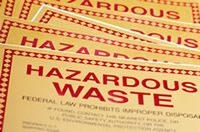Tag: CFR
RCRA Training Checklist All Generators Can Use
(This checklist includes requirements for small quantity generators of hazardous waste, which are not covered under 40 CFR 264.16 and 40 CFR 265.16.) Do you generate RCRA hazardous waste? If yes, are you a conditionally exempt small quantity generator (CESQG) (under federal definition, the generator of 100 kilograms (kg) or less per month of nonacute […]
Keeping the Right Records for PCBs
Most Misunderstood Regs–Pesticide Storage and Disposal Statements
UST Insurance Policies—Owners and Operators Need More Education
UST Releases: What You Have to Report Within 30 Days, 45 Days
UST Reporting Within 30 Days of Release A leaking tank may be repaired if standard industry practices are followed. After completion of the repair, the tank must be tested within 30 days. When testing the tank, use one of these methods: An industry-standard internal or tightness test Leak detection monitoring (but not the combination method […]
UST Release Reporting: How to Know What to Do and When
Immediately After Release If you suspect that a release may have occurred, you must immediately notify your state or local implementing agency. If the tank is in territory controlled by Native Americans, you must contact the EPA regional UST program office. Quick action on your part can minimize the extent of environmental damage and the […]
Keeping Up with SPCC Amendments
The SPCC regulations were last amended October 2011 to extend the date for SPCC compliance for farmers to May 13, 2013, effective immediately. Another recent amendment was the one made in October 2010, which extended the compliance date for certain facilities. The bulk of the recent changes were the November 9, 2009 amendments, which had […]
To Manifest or Not
Here’s the answer. Manifest procedures for shipments of containers that do not meet the EPA definition of “empty” (as defined in 40 CFR 261.7) are addressed in the federal regulations at 40 CFR 263.21(b) and 40 CFR 264/265.72. Container residues, which are residues that exceed the quantity limitations for an “empty container,” are considered a […]







